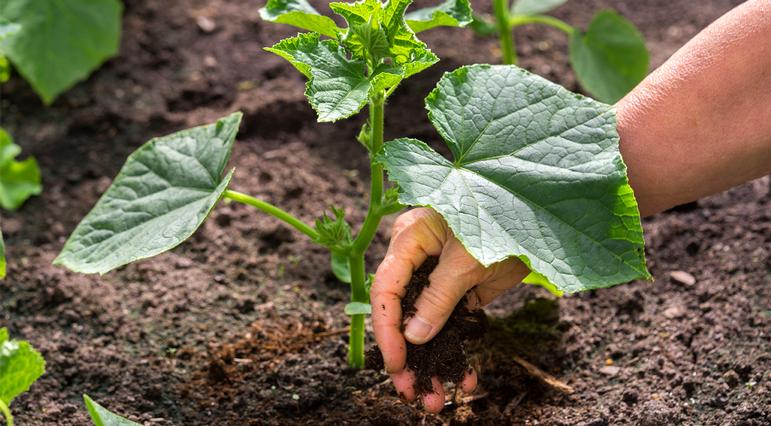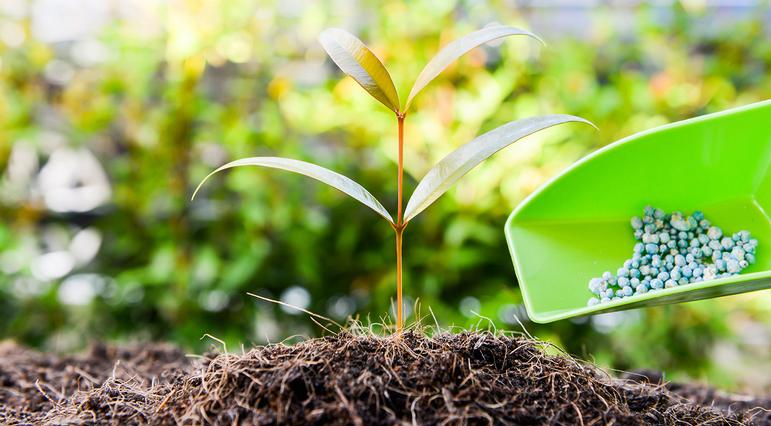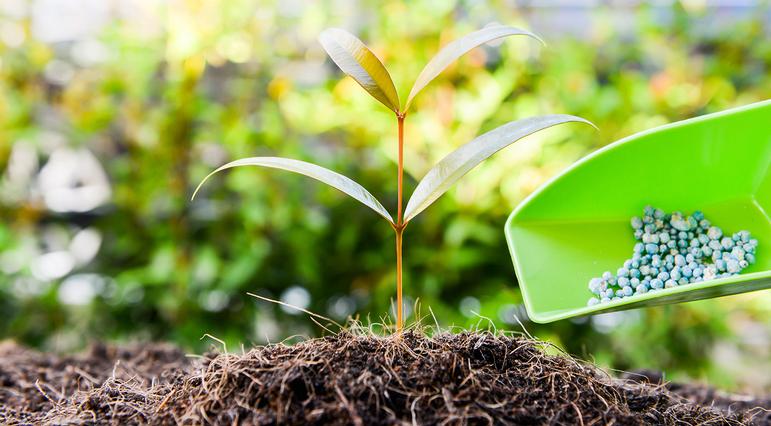Organic vs. Synthetic Fertilizers: Sustainable Feeding for All Your Flora

Organic and synthetic fertilizers aren’t just two formulas of the same thing. We explain the differences between how they work, and how each impacts the environment.
Plants, like people, need both nature and nurture to fulfill their potential. While anyone can plant a seed, the environment you plant in impacts every stage of its development. Fertilizer plays a key role in keeping your plants healthy and beautiful by replenishing essential nutrients in the soil. But, not all fertilizers are created equal.
Fertilizers are divided into two broad categories—organic and synthetic. Let’s take a look inside these two very different bags and examine how they work.
Why Use Fertilizers?
Fertilizers, as the name implies, improve the fertility—or nutrient density—of your soil. When we talk about organic and synthetic fertilizers, we’re referring to the ways these formulas are produced.
Organic fertilizers are naturally occurring products, usually derived from compost, manure, or other organic materials.
Synthetic fertilizers are produced in a lab, and generally come in the form of granules or concentrated liquids. It’s helpful to know how both types of fertilizer work before you choose one off the shelf.
Organic Fertilizers: A Steady Diet
It should come as no surprise that organic gardeners tend to prefer organic fertilizers. Organic fertilizers do a better job of mimicking an ideal natural environment than synthetics, as their contents come from all-natural sources. As far as your garden beds are concerned, it’s entirely possible that a flock of chickens or herd of cattle have left behind a feast of soil nutrients!
You could think of plants fertilized with organic fertilizers the same way you’d think of feeding your family a healthy, home-cooked meal. Organic fertilizers are rich in micronutrients and break down slowly to nourish your plants in the long-term. The beneficial microbes living in your organic fertilizer build colonies that not only feed your plants, but improve the overall quality of the soil over time.
So why doesn’t everyone stick with organic fertilizer? The same reason it’s hard to stick to a diet—it takes time to see results. Organic fertilizers contain the same, if not more, nutrients as synthetics but in lower numbers, so it takes some time for your plants to reap the benefits. While the lower numbers of nitrogen, phosphorus, and potassium (the key nutrients of all fertilizers) in organics are actually more sustainable for the environment, they break down at a much slower rate than synthetics.
Synthetic Fertilizers: A “Shot of Espresso”

Synthetic fertilizers are designed to release a burst of nutrients very quickly directly to the plant roots, which causes something like a “caffeine buzz” for your plants. Unlike organic fertilizers, synthetics come in specific NPK ratios—exact ratios of nitrogen, phosphorus, and potassium. Companies that develop synthetic fertilizers have figured out that certain plants respond to different ratios to achieve specific results. For example, most of the annuals you see at big-box garden stores are heavily reliant on synthetic fertilizers, which are often formulated to force the plant to bloom profusely for their very short lifespan. You might notice if you’ve ever transplanted these plants into an organic garden bed, it doesn’t take long before they start to fade.
Now, we all love flowers here, so how could this be a problem? Well, consider what might happen to you if you relied on a caffeine-only diet. First of all, synthetics don’t offer complete nutrition—these formulas contain virtually none of the micronutrients or microbes in organics that support long-term plant health. These quick-release formulas mix with water to give plants a jolt to the system, but water quickly flushes them through the soil, leaving no long-term nutrients behind. What you end up with are plants that are reliant on synthetic fertilizers, and an unnatural excess of nitrogen, phosphorus, and potassium in the groundwater around your garden. This can cause a disruption in the balance of nature that far outreaches your property. For example, the overuse of synthetic fertilizers here in Hockessin can contribute to algae blooms in waterways all over Delaware, among other environmental consequences.
Eco-Friendly Fertilizer Usage
We’re big advocates of sustainable gardening at Gateway Gardens. A major part of that is helping you choose organic fertilizers that support your garden as part of a larger ecosystem. Some organics are more appropriate than others for growing tomatoes, achieving beautiful flowers, or feeding bulbs. Each garden is an ecosystem of its own, so we prefer to help you work with the environment you have rather than fighting it with synthetics and other short-term fixes. The experts at our garden center in Hockessin are happy to advise you about how each of our organic fertilizer lines can help you achieve tastier vegetables, healthier perennials, and a more beautiful garden overall.
We also offer garden coaching in New Castle County, which lets us work with you in your own backyard to develop an environmentally-friendly, long-term gardening plan. Our garden coaches can recommend organic fertilizers as well as integrated pest management (IPM) tactics to promote a naturally balanced, chemical-free garden.
